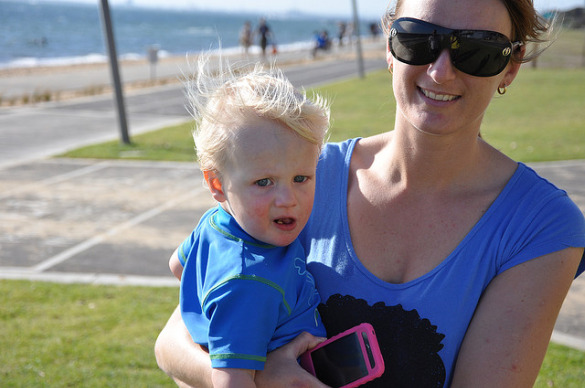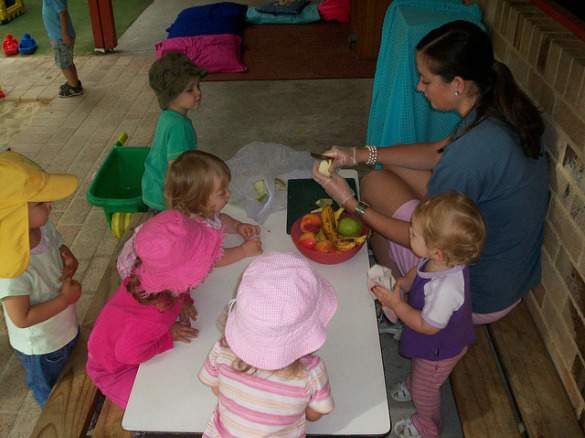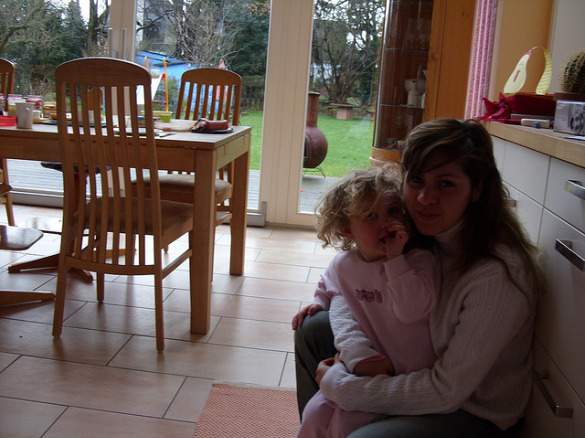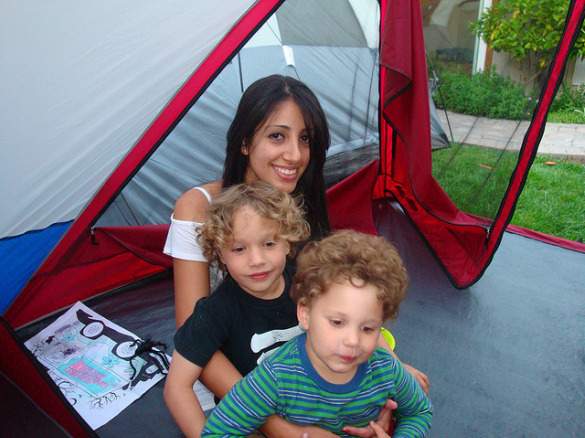For a lot of people, living abroad can seem like an unreachable dream. For many, an extended international voyage seems impossible due to a lack of language skills or work experience or an inability to take on the large financial burden that usually accompanies a big trip beyond the borders of their home country. Though opportunities for studying and teaching English abroad abound, those opportunities aren’t always for everyone. Luckily, there are other options out there.
If you’re not a student, aren’t interested in teaching English, or don’t like the idea of arranging your own housing in a new country, one of the options you might want to explore is becoming an au pair. With duties ranging from childcare to simply speaking your native language, plenty of benefits, and a lot fewer expenses than your normal trip abroad, it’s a great option that’s often overlooked by even the most seasoned expats. Here’s an introduction to life as an au pair and everything you need to know to get started on your own international adventure.
What is an au pair?
An au pair is generally a young foreign national who works in the home of a family, helping to look after children, speaking in their native language, and occasionally doing some light housework, though duties can vary widely depending on the needs and desires of the host family. But before nightmarish images of scrubbing floors, screaming babies, and maid’s uniforms come to mind, consider the origin of the term. “Au pair” is a French phrase that means “on par” or “on equal standing” and comes from the idea that an au pair is meant to be more of a member of the family than domestic help. Working as an au pair is generally seen as a type of foreign exchange where the participant contributes to family life by providing help with the kids and around the house in exchange for room and board and the experience of living in another culture.
Duties and responsibilities
The duties and responsibilities that an au pair is expected to take on vary from family to family. Most want their au pair to look after and play with the children while helping them learn a new language, but there is a huge range of possibilities, and anyone looking into spending time abroad as an au pair should make sure that they fully understand the expectations of the host families they are considering.
Some families will expect the au pair to perform basic household chores such as laundry or dishwashing. Some au pairs will cook dinner or take care of pets, and others may be asked to drive the family car to pick the children up from school. Online placement agencies such as Great Au Pair allow families and job-seekers to create profiles that clearly outline what they do or do not want in an au pair, which makes it easy to find a family whose expectations match the kind of work that you are willing to do.
Most au pairs are expected to work 25-35 hours a week, though this varies based on location and the family’s needs. A typical weekday in the life of an au pair might involve waking up with the children to get them ready for school, then having most of the day free, then returning to work in the afternoon when the children come home from school until they are put to bed in the evening. If an au pair is working over the summer vacation or with very young children, the schedule could be completely different, so it is important to be aware of the hours you’re expected to work before you go.
Work on weekends depends on the family, though all au pairs should have at least one day completely free during the week, normally Sundays. Some countries, including the United States have very clearly defined rules regarding how long au pairs can work each day and what they tasks they can be asked to perform, but for many people, these things will be decided between the au pair and the family based on the needs and desires of everyone involved.
Requirements and qualifications
There is no basic requirement to be an au pair, though having previous childcare experience and personal or professional references will make finding a good family much easier. Most families seeking an au pair are looking to improve their children’s foreign language skills, so being a native or near-native speaker of English, French, German, or other sought-after languages is likely to increase your chance of getting a quick placement. It’s also usually helpful to have at least a basic ability to speak and understand the language of the host family, not only to communicate with the parents and children, but also to make the most of your time off. Usually, however, this ability isn’t a requirement, so if your heart is set on working in Paris or Berlin, you should still give it a try even if you can’t speak a word of French or German.
Occasionally a family might be looking for additional skills or talents. Families with active children might be drawn to au pairs with lots of athletic experience. Other families may be looking for an au pair to help their children practice the piano or perfect their cello skills. If you have musical, athletic, or any other special talents that might be put to use, it’s a good idea to point them out on your online profile.
Outside of what the individual families may require from an au pair, there may also be official rules and regulations to consider. It is always important to keep the immigration laws of the country you intend to visit in mind when heading abroad for an extended amount of time. Many au pairs choose to work for 90 days or less in countries like Spain or France to avoid the need for a visa. Online placement or matching services such as Au Pair World or AuPair.com have country-specific advice on the topic, but it’s always a good idea to check with the local consulate of the country you’d like to visit before entering into any agreements with families abroad; they will be able to tell you how long you can stay in the country and what kind of documentation, if any, is needed to work as an au pair.
Host families, pay, and benefits
Host families come from all walks of life and will vary widely from country to country, so it is important to learn as much as you can about the people you’ll be living with before buying your plane ticket and packing your bags.
Generally, families who can afford to house and pay an au pair tend to be financially comfortable, but that doesn’t necessarily mean that you’ll be spending your time abroad lounging around the pool of a palatial mansion. Yes, there are families with enormous houses, private chefs, and rooftop swimming pools, but there are also many families who live in normal apartments in regular neighborhoods.
Most families will offer the au pair a private bedroom with furniture and linens, as well as meals, laundry privileges, and possibly a few other perks. Some au pairs receive transit passes, gym memberships, language classes, or the ability to use the family car, while other au pairs might have to cover these expenses on their own, or live without them. In general, au pairs pay for their own flights to and from the host country, but there are typically very few expenses for the au pair to cover once they arrive in their new home.
On top of the room and board provided by the family, it is standard to provide a weekly or monthly stipend. This stipend will vary from family to family and country to country, but typically is large enough to cover nonessential expenses such as sightseeing, weekend travel, and shopping. To provide an example, a typical weekly stipend for an au pair working in Madrid, Spain would be somewhere between 60 and 100 euros per week for 25-35 hours of work. Many websites will provide sample pay scales to give an idea of what should be expected in different countries, though the family you’re working for will ultimately decide what you’ll be receiving.
While the monthly stipend will provide you with all the money you’ll need, the generous free time most au pairs have each day provides a good opportunity to supplement your income by offering private English lessons or extra babysitting. With no food or rent to pay, having even a little extra money on the side will keep you financially comfortable during your stay.
It’s important to find out what the family is providing, what your monthly stipend is, and where you’ll be living before you sign up. Ask the family to provide photos of your room and ask questions if it’s unclear how you’ll be paid. There usually aren’t any contracts or formal agreements involved when you’re an au pair, so having everything clearly laid out before your departure helps to avoid miscommunication.
Aside from room and board, your monthly stipend, and any other perks you might receive from the family, being an au pair also provides a very economical way to practice a new language. If you’re looking to improve your Spanish, French, or any other language, living with a family is one of the best ways to learn. Often times, families will bring their au pair on holiday with them, so free travel is another potential benefit of the job.
While there are definitely a lot of benefits to being an au pair, it’s also important to consider what’s not included. Transportation to and from your new home is a cost that you’ll need to cover on your own. Health insurance is also rarely included, through there are many dependable and affordable options for comprehensive international coverage, such as the plans offered by HTH Worldwide.
Finding a family and picking a destination
Once you’ve decided that being an au pair is a good option for you, it’s time to find a family. There is a huge selection of websites that offer to help match au pairs with families, either for free or for a small fee. It’s worth trying some of the free websites like FreeAuPair.org or EasyAuPair.com before paying the registration fees that some sites like GreatAuPair.com require.
There are other ways to get connected with families online as well. There are Facebook groups, such as “Au Pair in Madrid” or “Au Pair in Paris” that are excellent resources for anyone looking for a family in a specific area. Oftentimes these groups also provide a way to get in touch with other au pairs currently living nearby. Sometimes au pairs who are leaving their families will offer to help them find a replacement, so you can speak with people who have already worked with the family about what to expect and ask questions about anything you’re unsure of before you leave.
After you’ve checked out all of your options, making a complete, presentable profile on some of the online matching services, complete with photographs, will help you get responses. Be clear about what you are or are not willing to do when it comes to housework and chores, what types of allergies you have, what kind of compensation you expect, etc. Most families will post their pay scales and tell you what they are willing to provide, but it’s always a good idea to make sure that everything is clearly laid out before proceeding with any family.
While it can often seem like families have the upper hand in the placement process, it is important that you be selective as well. Don’t rush into a match with a family if it’s not exactly what you want. Remember that this will be your life for several months at least, and having a family that is a good match for you is worth the extra time it might take.
It’s also important to consider the number of children you’ll be caring for and how old they are. Taking care of a toddler is a completely different experience than watching two twelve year olds, so it’s good to find out as much as possible about the kids. Do they like sports? Are they active? Do they have any special needs or health problems? All of these things must be considered before you can accurately gauge whether or not you and the family would be a good match.
Location can also make or break your experience abroad. If you want to live in a big city, consider where the family lives in relation to the city center. Many times families will live in suburban areas outside of the city. Knowing where you’ll be living and what your transportation options are can help you determine if you’ll have the type of experience you’re looking for. Living in a big city means it will likely be easier to meet other au pairs and international students, but living in a small town would offer a completely different experience. All of these things are important to consider before leaving, so be sure to do your research on where you want to spend your time abroad, it will likely be just as important to your overall experience as the family you end up living with.
Drawbacks, downsides, and things to watch out for
Despite all the incredibly positive things about being an au pair, it’s certainly not for everyone, and there are some drawbacks to living with and working for a family.
The hours are not typical, which can be frustrating once you’ve gotten settled and made friends with students or people with “normal” jobs. Depending on your family’s needs, schedules can also be inflexible at times. Some families need the au pair to baby-sit once or twice a week, and being sometimes being asked to stay in on Friday or Saturday nights isn’t one of the job’s most positive aspects.
Depending on your living arrangements and the daily life of the family, living in the house that you work in can also bother some au pairs. Even if you’re technically off the clock, that won’t always stop the children from wanting to play with you, and things like crying in the middle of the night is just a fact of life for families with young children. Most au pairs have to live without having friends over to their house or eating their preferred foods at their preferred times, but those sacrifices are part of the deal in any host-family situation.
Working with children also isn’t for everyone. Some people love it, others might not have the patience or the desire to play with young kids or teenagers for hours on end. It can be an extremely rewarding experience for those who love it, but for others it can be entirely too much. It’s also not a job that you can do half-heartedly—these families are trusting you with their children, and when you take on an au pair job, you are making a promise to your family to be a responsible and attentive caretaker for their kids.
Many families will have a preference for young female au pairs, which can be an obstacle for guys who are interested in working in childcare. While it’s possible to find a position as a male au pair, it will likely take longer and you’ll probably have fewer families to choose from. There are also age restrictions put in place by many placement agencies or governments, so if you’re under 18 or over 30, you’re likely to have a hard time finding a family to work with.
And while the benefit of free room and board makes au pairing an excellent option for travelers on a budget, the monthly stipends are too low to support the jet-setting lifestyles that many people dream of having while living abroad. Depending on your schedule, weekend or holiday travel might be possible, but it will be hard to afford big purchases like weekend trips unless you head abroad with a little savings or supplement your income with side jobs like private English lessons.
Being an undocumented worker, which many au pairs are, can have its upsides and its downsides as well. It allows for flexibility, but without a contract, there is always a risk of getting ripped off. And as with any travel plans made over the internet, a certain amount of precaution must be taken to ensure that the family you’re speaking with are exactly who they say they are. Most of the placement websites have safeguards in place to help weed out suspicious members, but always keep in mind that you are meeting this family through the internet and don’t agree to work for a family if something doesn’t seem right.
Lastly, sometimes a family that seemed great online or over the phone, or even one that was referred by a friend or a family member just doesn’t work out in real life. If you don’t get along with the parents or the children, if you find yourself having an allergic reaction to their pets, or even if the family’s schedule just doesn’t work for you, living and working with them can become difficult or even impossible. Luckily for au pairs who find themselves in that situation, the lack of contracts or formal agreements can be a blessing, making changing families as easy as finding someone else who meets your requirements, or just changing your flight to come home early.
Other resources
If you’ve considered all sides of the issue and you’ve decided that being an au pair is the best way to get abroad, here are some helpful resources to help you get started.
The following websites are a few examples of companies or organizations who help match families with au pairs around the world, some for free, some for a monthly or one-time fee.
Au Pair Online
AuPair.com
Au Pair World
FreeAuPair.org
EurAupair
Cultural Care Au Pair
Great Au Pair
Photos by: 1 – thomasrdotorg , 2 – Jessica Hoolko, 3 – The Hennessy’s, Haltungsturner, ArcYang, theevancarroll





